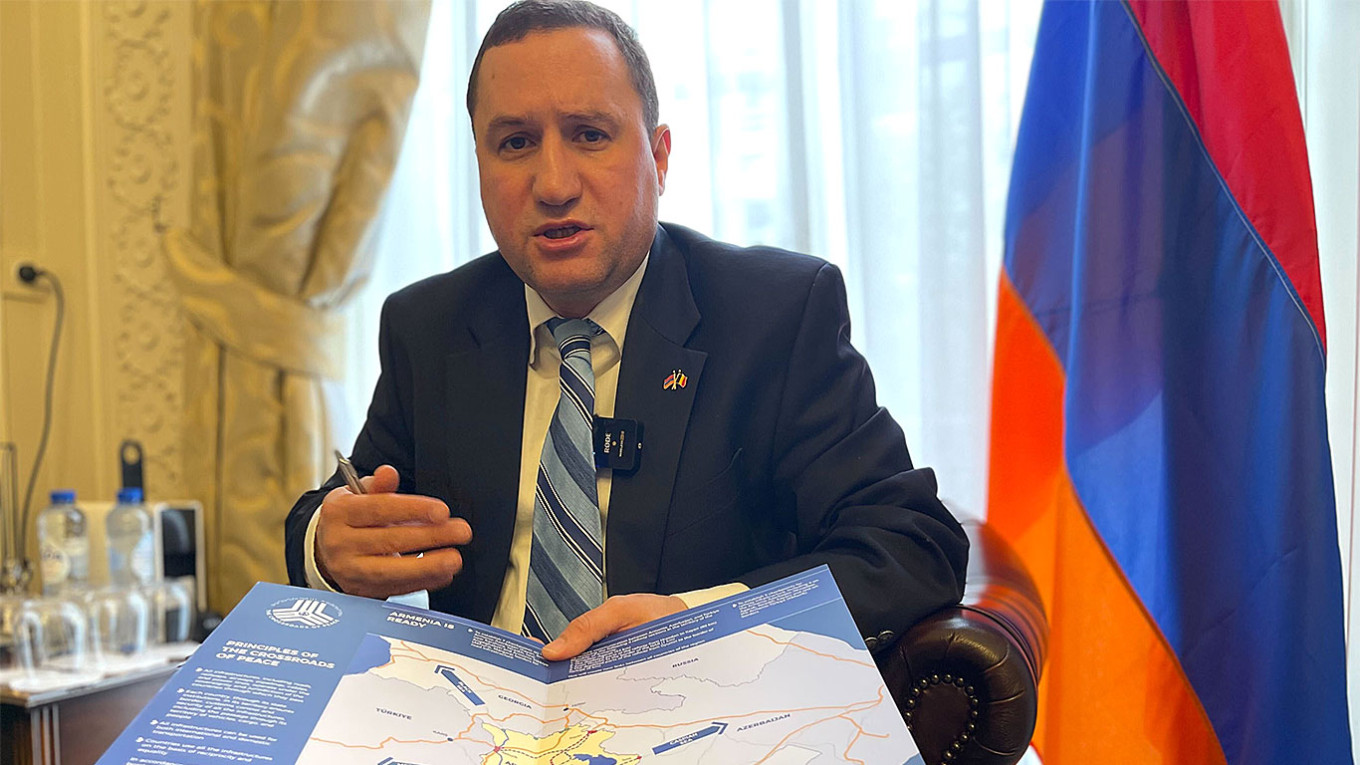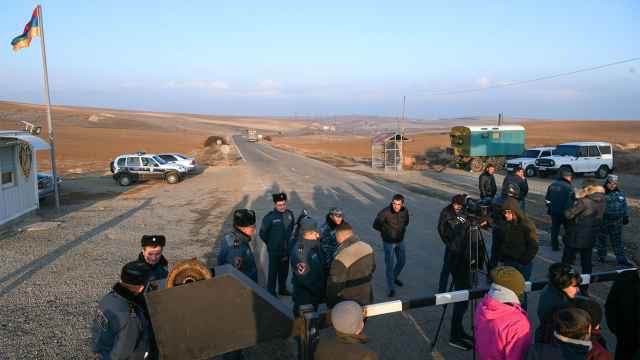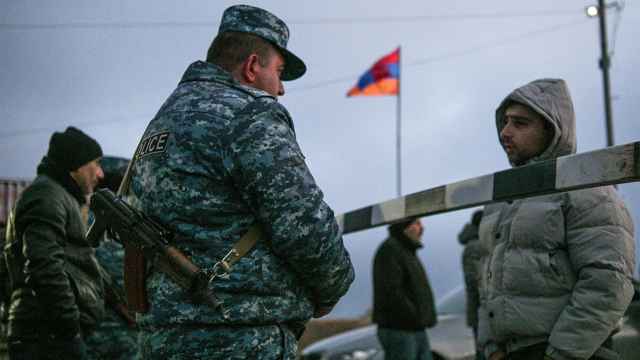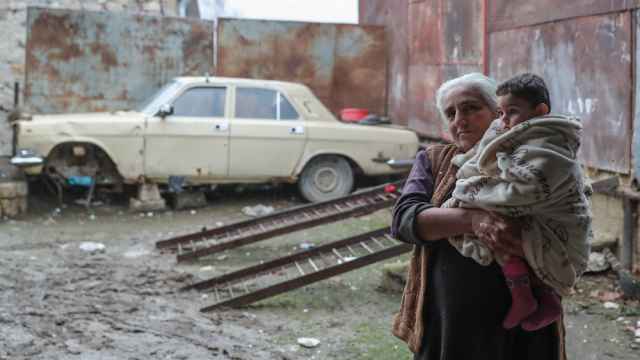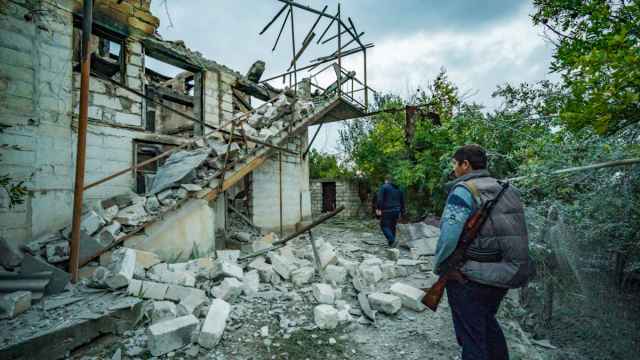BRUSSELS — Armenian Prime Minister Nikol Pashinyan’s visit to the seat of the European Union this month underscored the country’s delicate balancing act as it branches outside Russia’s sphere of influence.
After talks with EU President Ursula von der Leyen and U.S. Secretary of State Antony Blinken, Brussels and Washington promised to provide Armenia with 270 million euros and $65 million respectively.
Security, a key issue for Armenia in the absence of a lasting peace with neighboring Azerbaijan, was not mentioned as one of the areas of cooperation — but the talks nonetheless inflamed Moscow.
"The U.S. and the EU are trying to drag the South Caucasus into geopolitical confrontation," the Russian Foreign Ministry said in a statement after Pashinyan’s meeting in Brussels.
Yerevan fundamentally disagrees with this view.
"We are grateful to our partners in Brussels and Washington for this unwavering support for Armenia's sovereignty and territorial integrity and development. In building an Armenia that will be economically strong, that will be friends with all countries," Tigran Balayan, Armenia’s Ambassador to the EU, told The Moscow Times.
"Among these countries, of course, Russia is at the top of the list.”
Though Balayan took up the post of Armenia's chief diplomat in Brussels only a year ago, he has firsthand knowledge of the problems his country faces.
His family has roots in Nagorno-Karabakh, the breakaway region internationally recognized as part of Azerbaijan, and he did his dissertation on the region and international diplomacy in 1991-1994. His father, a member of Armenia's Constitutional Court and a longtime MP, was born and raised in Nagorno-Karabakh when it was an autonomous district of the Azerbaijani Soviet Socialist Republic.
As a diplomat, Balayan has worked in the Armenian Foreign Ministry and the Armenian embassy in Moscow in addition to several long-term assignments in European countries.
While he acknowledged that it is unrealistic to expect the EU to act as a security guarantor, he said the EU now has an opportunity to help Armenia ensure its own security.
Armenia has been one of Moscow's closest strategic allies since the Soviet collapse, receiving security guarantees and economic support in exchange for hosting a large Russian military base and FSB border guards.
Yerevan has agreed to pay for Russian energy imports using the ruble and is a member of the Moscow-led Commonwealth of Independent States (CIS), Eurasian Economic Union (EAEU) and Collective Security Treaty Organization (CSTO) blocs.
Relations between the two countries have visibly worsened since September 2023, when Azerbaijan seized control of Nagorno-Karabakh in a lightning offensive that displaced the region’s 120,000 ethnic Armenians.
Despite Moscow’s security guarantees, the presence of Russian peacekeepers and Armenia's membership in the Kremlin-led CSTO, neither Moscow nor the CSTO made a concerted effort to intervene.
Yet Yerevan’s main grievance against the CSTO stems from the alliance’s perceived inaction toward Azerbaijani attacks on Armenian border crossings and settlements in May 2021.
"After we asked our CSTO partners for assistance, we did not even see a formal response. It is the same with regard to Russia. They are not even able to make a statement that Armenia's territorial integrity was violated. This is the problem and our main complaint against the CSTO," Balayan said.
The CSTO, a Moscow-led military-political alliance that emulates NATO, has a rotating chairmanship. Balayan said Yerevan has always tried to strengthen the organization and its international prestige when it has held CSTO chairmanship.
As Armenia’s ambassador to the Organization for the Prohibition of Chemical Weapons (OPCW) in The Hague, Balayan organized a joint statement by CSTO member states to the OPCW Executive Council.
“This was Armenia's initiative. For the first time, we succeeded in getting a CSTO representative invited to an OPCW meeting," Balayan said.
"It is doubly painful now to see how the CSTO has screwed us.”
Since invading Ukraine in February 2022, Russia has stepped back from its role as regional power broker and been forced to pour most of its forces and resources into the war.
In addition, Moscow is under heavy Western sanctions including a ban on high-tech imports, which Turkish leader Recep Tayyip Erdogan — a close ally of Azerbaijan’s Ilham Aliyev — is partially helping to circumvent.
Balayan claimed that the Russian military handed Azerbaijan the former leaders of Nagorno-Karabakh — who were under their protection at the Russian military base at Karabakh’s airport — after Baku’s military captured the region.
He alleged that Russian-Armenian businessman Ruben Vardanyan, Karabakh's last state minister, was kidnapped from the Lachin Corridor, where Russian peacekeepers were supposed to guarantee free passage. Vardanyan and the two former Karabakh presidents have been imprisoned in Azerbaijan since September 2023.
On April 17, Russia and Azerbaijan announced that Moscow would start withdrawing its peacekeepers from Nagorno-Karabakh, where they had been stationed since November 2020 as part of a Moscow-brokered agreement to end a six-week war between Yerevan and Baku.
While Moscow’s presence in the region is gradually declining, an EU observer mission was deployed to Armenia’s border with Azerbaijan in 2023 at Yerevan’s invitation.
"I emphasize, these are civilian observers. Because our Russian friends often have assessments that do not correspond to reality about the nature and the kind of tasks of this mission. [These observers have] become a stabilizing factor," Balayan said.
"When we hear now that the CSTO is ready to send observers to Armenia's border,” he continued. “The question arises: What border? Where is the border?"
Armenia froze its participation in the CSTO in February, further inflaming tensions with Moscow. Balayan declined to answer whether Armenia plans to leave the alliance altogether.
"We are waiting for the CSTO to be able to react. How long this will last is decided collegially in Yerevan, depending on the information we receive from Moscow and other capitals of the CSTO member states,” he said. “[Ten days ago] we had a visit from the president of Kazakhstan. Although it has not been publicly discussed, I think this issue and the fact that it cannot go on like this has been discussed."
At the same time, Armenia is taking steps to reduce the Russian presence on its territory.
In March, the country informed Moscow that it no longer needs Russian border guards at Yerevan’s Zvartnots International Airport, where they had been stationed at Armenia's request since 1991.
According to Balayan, Yerevan asked Moscow to remove its border guards starting Aug. 1 and “expressed gratitude for decades of joint service.”
"Maybe Russian border guards will be needed somewhere else. Russia has very long borders. Where exactly [they go next] is for the Russian leadership to decide," Balayan said.
The diplomat stressed that there are no plans to withdraw Russian border guards elsewhere in Armenia, nor are any changes planned at the Russian military base in Gyumri.
Over the past year, at least two Russian citizens in Armenia who deserted from the Russian military have been detained by Russian officers and brought to the military base in Gyumri. One of the deserters was taken to Russia, while the fate of the second remains unknown.
Operations on Armenian territory that are not legally authorized are unacceptable, Balayan said of these incidents.
"A probe is underway now. If violations are found in the Russian military police’s actions, measures will be taken," Balayan said.
Armenia's recent decision to join the International Criminal Court (ICC), which issued an arrest warrant for Russian President Vladimir Putin in 2023 on war crimes charges, angered Moscow at the highest level.
However, Balayan said that Putin would face no risks if he were to visit Armenia, as he has presidential immunity.
The main purpose for joining the ICC is "preventive guarantees of new aggression by Azerbaijan towards Armenia," Balayan said. He also said he expects that joining the court will make it possible to prosecute alleged war crimes committed by Azerbaijani forces.
Since relations with Yerevan started to deteriorate, Kremlin-controlled Russian state television has regularly aired attacks on Armenia's leadership and policies.
Last month, Yerevan blocked Russian propagandist Vladimir Solovyov’s shows, citing “continuous violations.”
"These programs have a certain negative impact in Armenia. Primarily on the Russian-speaking citizens of the country," Balayan said. "It's not only about the negative influence towards our country’s leadership but also towards the very idea of Armenia being an independent state.”
Armenian officials are in talks with their Russian counterparts to make clear that these broadcasts are unacceptable and will be banned if they persist, he said.
"Imagine someone on Armenian TV trumpeting the most negative things about Putin for 50 minutes. How would Russia react?" he said. "We cannot watch the very idea of Armenian statehood be questioned every day in the most brazen terms.”
Balayan said he has been alarmed by statements from Russian officials amid the mounting friction in bilateral relations.
"Unfortunately, we hear statements that Armenia is being 'Ukrainianized.’ This causes us and the people of Armenia great concern."
In another irritant for Russia, Yerevan "recognizes the territorial integrity of Ukraine" according to its 1991 borders declared and recognized by the international community after the Soviet Union’s dissolution.
Balayan called the more than two-year war in Ukraine a "great human tragedy" and said Yerevan’s official stance on the conflict, which refrains from vocally backing either side, has brought it under "pressure from different sides."
"But for now I would tell you that we are trying to build our relations with Russia, regardless of what Russia is doing in Ukraine.”
“It is again necessary to start explaining Russia's interests to the Russians,” he cited a saying in Armenia as saying, and stressed that it’s in the interests of all of Yerevan's allies to have an independent, stable and friendly Armenia.
“Armenia and Russia have been friends for centuries. Yerevan does not want to lose a friend. Yerevan has done nothing to lose Russia as its loyal friend. And Yerevan is still doing everything possible for Russia to be our loyal friend,” Balayan said.
"I would very much like to hear from Moscow — from the mouths of those who inflame the situation every week, insult Armenia, accuse it of hostility, of ‘Ukrainianization’ — the statements: ‘We are ready to help you, here is our road map.’ As it sounded in [von der Leyen and Blinken’s] joint press release after the meeting with the Armenian prime minister."
A Message from The Moscow Times:
Dear readers,
We are facing unprecedented challenges. Russia's Prosecutor General's Office has designated The Moscow Times as an "undesirable" organization, criminalizing our work and putting our staff at risk of prosecution. This follows our earlier unjust labeling as a "foreign agent."
These actions are direct attempts to silence independent journalism in Russia. The authorities claim our work "discredits the decisions of the Russian leadership." We see things differently: we strive to provide accurate, unbiased reporting on Russia.
We, the journalists of The Moscow Times, refuse to be silenced. But to continue our work, we need your help.
Your support, no matter how small, makes a world of difference. If you can, please support us monthly starting from just $2. It's quick to set up, and every contribution makes a significant impact.
By supporting The Moscow Times, you're defending open, independent journalism in the face of repression. Thank you for standing with us.
Remind me later.



